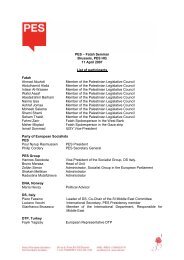Hedge funds and Private Equity - PES
Hedge funds and Private Equity - PES
Hedge funds and Private Equity - PES
Create successful ePaper yourself
Turn your PDF publications into a flip-book with our unique Google optimized e-Paper software.
The importance of Europe’s transition to an information society is documented in the EU –<br />
Lisbon Agenda 2010 Information Society initiative launched in June 2006, which is a renewed<br />
commitment to the Lisbon reform agenda. It seeks to promote an open <strong>and</strong> competitive digital<br />
economy as well as an integrated approach to information society <strong>and</strong> audio media policies in the<br />
EU. This requires upgraded telecom networks across Europe that can provide the broadb<strong>and</strong><br />
capacity needed for information societies. There are three main priorities for Europe’s information<br />
society <strong>and</strong> media policies:<br />
1) the completion of a single European information space which promotes an open <strong>and</strong> competitive<br />
internal market for information society <strong>and</strong> media;<br />
2) strengthening innovation <strong>and</strong> investment in ICT research to promote growth <strong>and</strong> more <strong>and</strong><br />
better jobs;<br />
3) achieving an inclusive European information society that promotes growth <strong>and</strong> jobs in a<br />
manner that is consistent with sustainable development <strong>and</strong> that prioritises better public services<br />
<strong>and</strong> quality of life49 . It is difficult to see how private equity ownership of telecom<br />
infrastructure operators will promote these objectives, <strong>and</strong> experience suggests that in many<br />
cases they would be acting contrary to these objectives.<br />
BTC case, Bulgaria<br />
Set-up in 1992, the Bulgarian Telecommunications Company (BTC) is the former national<br />
operator in Bulgaria. The company provides 97% of fixed line services in the country as well<br />
as holding a substantial interest in the mobile market.<br />
Following a lengthy two-year privatisation process, Advent International agreed the purchase,<br />
through the Austrian operation, Viva Ventures, of a 65% stake in BTC in June 2004 for<br />
EUR 230 million plus a E 50 million capital increase. In 2004 the owners took dividends<br />
of EUR 75m.<br />
During this period, relations with BTC employees have deteriorated very badly. Employment<br />
has been reduced from 24.000 to less than 10,000 under conditions seen as secretive <strong>and</strong><br />
arbitrary by the employees, <strong>and</strong> in violation of the BTC privatisation agreement. After local<br />
unions filed complaints with the Bulgarian government of BTC’s failure to live up to its commitments<br />
in the Bulgarian Labour Code <strong>and</strong> European directives on information <strong>and</strong> consultation<br />
(98/59/EC <strong>and</strong> 2002/14/EC), a social partnership agreement was finally agreed with the<br />
company in July 2006. There is no confidence that BTC will be able to build a modern telecom<br />
network for Bulgaria in the near future.<br />
Issues of the financial stability of some large infrastructure operators have risen, affecting their<br />
capabilities to invest in long term network development. To illustrate, in 1999 at the height of<br />
the dotcom stock market boom, British Telecom, France Telecom, Deutsch Telecom, KPN<br />
Netherl<strong>and</strong>s, Vodafone <strong>and</strong> others all bid extraordinary sums for a limited supply of third generation<br />
(3G) mobile spectrum licenses. This raised their debt ratios <strong>and</strong> interest obligations to such<br />
a high level (the managements called them debt mountains) that they had to scale back their 3G<br />
investment programmes in major ways, significantly slowing economic growth in both the<br />
telecom services <strong>and</strong> equipment manufacturing sectors <strong>and</strong> delaying the introduction of new<br />
3G mobile services for several years, until debt mountains were reduced to levels that would<br />
support sustained long term development. During this period Europe lost its global leadership<br />
in mobile telecom development to Asia, where operator investment plans were not constrained<br />
by debt mountains. As a result, investment in new European broadb<strong>and</strong> telecom networks to<br />
provide enhanced Internet services for the future information economy, which was anticipated<br />
in the Lisbon Agenda targets for economic growth, have been slower than expected.<br />
49 COM (2005) 229 “i2010 – A European Information Society for growth <strong>and</strong> employment.” p. 4<br />
Part II – Six concerns about our European social market economy<br />
123




